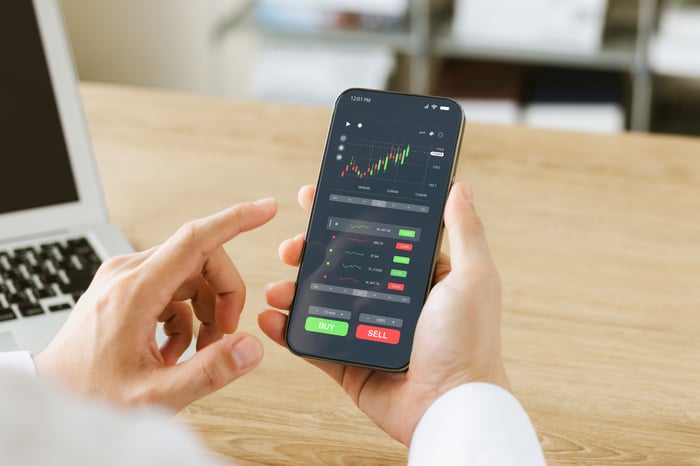It should be obvious, but brokers are in business to make money. So when they offer you something for free, you need to ask why and how. When it comes to free stock trades, the answers are important. But more important is how you go about using those free trades.
The trades aren't really free
I hate to admit this, but when I made my first stock trade I called a discount broker because online trading didn't really exist. And I paid something like $100 for my trade ... at a discount broker! A lot has changed in the ensuing decades and one big one is the cost of a trade, which has now gone all the way down to zero.

Image source: Getty Images.
That would seem like great news for investors, who don't have to pay for buying and selling stocks. But a broker isn't a non-profit organization, it has to make money somehow. The way Robinhood Markets (HOOD 3.38%) generates revenue, for example, is by being paid for order flow. Basically, market makers (which handle large volumes of trades around particular stocks) pay Robinhood for the privilege of executing your trades. Those companies hope to make money by increasing the trading volumes they handle.
According to Robinhood:
... the fees we receive are typically based on the size of the publicly quoted bid-ask spread for the security being traded; that is, we receive a fixed percentage of the difference between the publicly quoted bid and ask at the time the trade is executed. For options, our fee is on a per contract basis based on the underlying security. In the case of cryptocurrencies, our rebate is a fixed percentage of the notional order value.
This is a complicated and somewhat opaque system.
However, the big takeaway is that Robinhood and other brokers offering free trades make more money the more investors trade. This is where things start to get interesting.
Gamification is highly effective
One of the major tactics being used by the apps on your smartphone to increase usage is a strategy called gamification. Basically, by turning something into a game, the app encourages you to do more of it. For example, Chipotle Mexican Grill's app offers badges based on food purchases. The badges have no value, but the desire to earn one gets customers to order more frequently (I know, my wife and I compete over who has more badges).
In the case of Robinhood, the company attempts to make trading securities more like a game to entice customers to trade more often, because the more volume it passes on to market makers the more revenue it generates.
As an example, the Robinhood app used to show users a flurry of digital confetti after every trade, effectively giving them a visual reward for trading activity. The confetti did nothing for investor returns, but it may have created a behavioral incentive for more frequent trading. The key here is that the trade was, in the eyes of the investor, free, so there would be no perceived harm and only a benefit (the confetti).
More frequent trading isn't necessarily a good thing for investors, though, since it will likely lead an investor to see stocks as data points and not what they really are -- a percentage ownership in a company. As Warren Buffett said, "If you aren't willing to own a stock for 10 years, don't even think about owning it for 10 minutes."
If there were a clear cost associated with the trade, even if it were modest, that confetti probably wouldn't have had nearly as big an impact. When you have to pay to do something, you generally think more carefully about doing that something. Free trades make it too easy to forgo the thinking piece of the investment equation and rely more on your emotions.
When it comes to buying and selling stocks, it is far better to think carefully before trading than it is to simply buy and sell with impunity. A commission, even a small one, is kind of like a roadblock that forces you to act more rationally. I'm happy to pay my broker a small commission because it reminds me that I'm investing, not playing a game.
BRK.A Total Return Level data by YCharts
And remember that the famous and highly successful investor Warren Buffett suggests that you act like you are buying a whole company when buying shares in it. His success hasn't come from rapid-fire trading, it is mostly driven by buying and holding great companies for the long term so he can benefit from their business growth over time.
For example, he's owned Coca-Cola and American Express for decades. That's a much easier tactic than trying to jump in and out of the market every two seconds, minutes, or even days to take advantage of what is likely to be relatively small stock moves when looked at over the long term.
Free trades aren't bad, but they are a risk
Those already prone to day trading will probably find commission-free trades wonderful, but most shouldn't use this high-risk approach. It is speculation, not investment. For those who think long term, like Buffett, free trades probably won't hurt or help all that much unless you get caught up in the game and start trading more frequently than you otherwise would.
At the end of the day, feel free to use the broker you like. Just go in knowing that free trades aren't actually free -- someone is paying. And there's a real risk you could end up slipping into a game-playing mentality (which is basically emotionally-driven trading activity) as your broker tries to entice you to buy and sell more often. While that will make your broker more money, it risks completely upending your investment approach and results.





